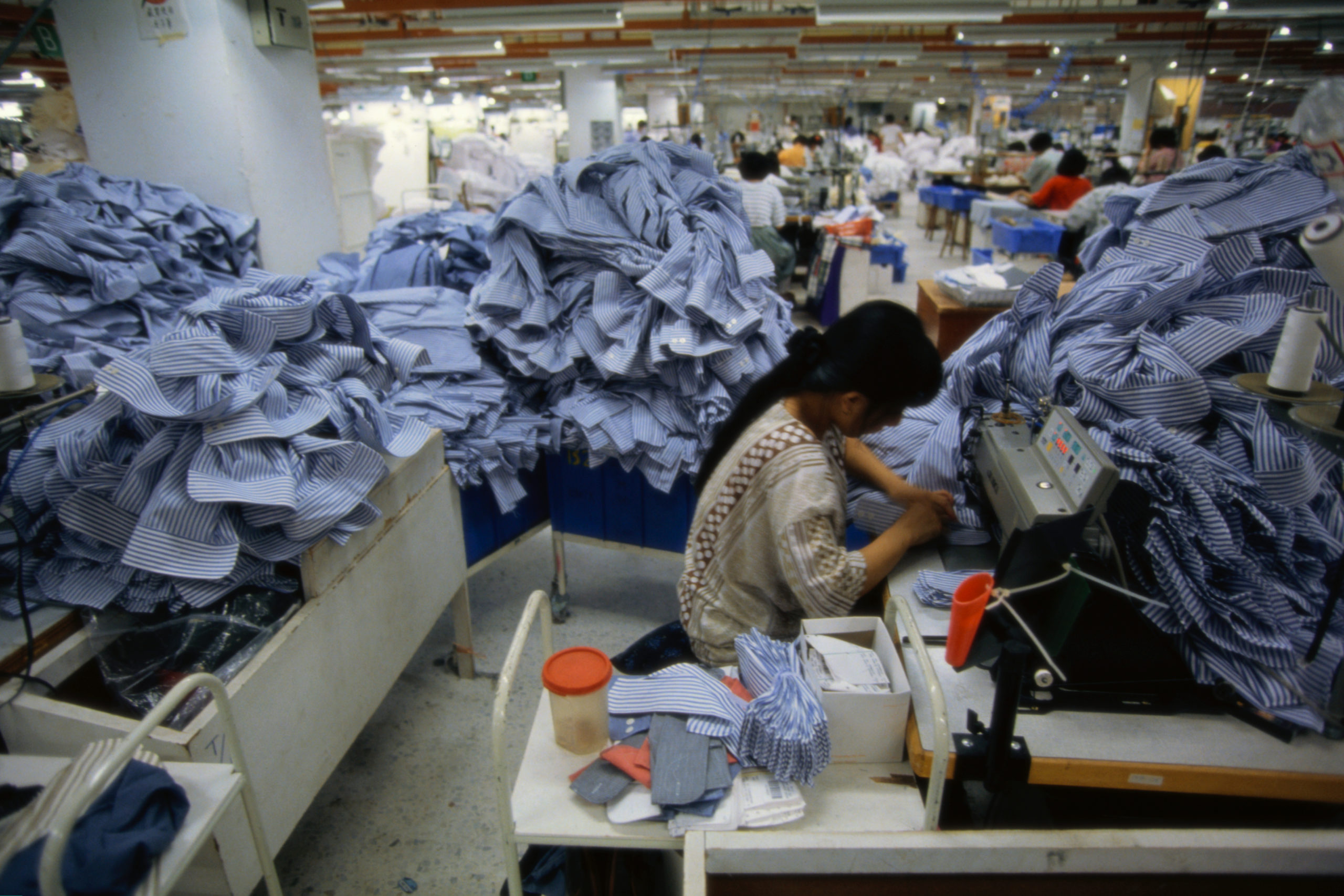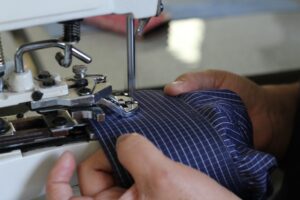In 2019, Transparentem initiated an investigation into hardships faced by workers at two Malaysian garment factories, both owned by a Hong Kong-based manufacturer. Of the 35 then-current Bangladeshi, Nepali, and Indonesian workers whom Transparentem investigators interviewed, all Bangladeshi workers reported paying substantial recruitment fees in their home country to secure their jobs in Malaysia; some Nepali and Indonesian workers also paid home-country recruitment costs. Workers said the factories deducted additional money from their paychecks to cover their recruitment fees and costs. Additionally, some interviewed workers reported deception, intimidation and threats by recruitment agents and factory staff, poor living conditions in factory-provided dorms, and problems with employment contracts.
After learning that both factories would close imminently in 2020, Transparentem provided the findings of its investigation to 13 apparel brands which appeared to sell products produced at the factories. Six of these brands, as well as the manufacturer, agreed to a collective repayment fund to partially reimburse workers for recruitment fees paid in their home country and to the factory, ultimately disbursing more than $1 million to workers. In total, 11 companies engaged in collaborative discussions around remediation.
Investigative Findings
Recruitment Fees Paid in Home Countries and in Malaysia: Most interviewed workers said they paid recruitment fees in their home countries to secure jobs in Malaysia. Bangladeshi workers took extraordinary measures to pay their recruitment fees and related costs, including using savings and/or selling assets, such as land and cattle. The majority of interviewed Bangladeshi workers said they took on interest-bearing debts. These debts compelled many workers to continue working in Malaysia despite poor living and working conditions.
Additionally, all interviewed workers said both factories required them to repay recruitment fees through wage deductions once they arrived in Malaysia. These payments were in line with the manufacturer’s policy to cover the cost of a worker’s recruitment fees upfront and then require workers to reimburse the company for these “loans” through wage deductions. Bangladeshi workers paid the most in these recruitment-related wage deductions, which equated to more than 10 months of minimum-wage pay in 2019 in Malaysia for some.
In its 2017-2018 Sustainability Report, the manufacturer explained that its practice of fronting the cost of recruitment was meant “to reduce the risk of [recruitment] agents over-charging recruitment fees.”
Deception: Most Bangladeshi interviewees at both factories said they were deceived by recruitment agents in Bangladesh and learned that they had to pay additional recruitment-related fees, financed through debt to the factories, only after they already paid steep recruitment fees to those same agents. Workers also told Transparentem that they were deceived about their expected wages, wage deductions, and working hours. For instance, many workers were led to believe they would earn higher wages based on promises from recruitment agents, with some Bangladeshi workers expecting to earn almost double their eventual wages.
Intimidation and Threats: All Bangladeshi interviewees at both factories said they were compelled by recruitment agents to participate in an apparent cover-up scheme to hide the fact that they paid fees in Bangladesh to secure their jobs in Malaysia. Nearly all interviewed workers said they were coerced to lie on camera, stating that they paid no recruitment fees, under the threat of not being able to migrate to Malaysia and losing the fees they had already paid. Once in the factories, some workers also described intimidation by factory managers, who threatened workers with deportation if they voiced complaints.
Abusive Living Conditions: Many workers complained of overcrowded living conditions in their factory-provided dormitories. Some workers complained that their dormitories had too few bathrooms and some said their agents had misrepresented the condition of the dorms. Some workers, however, had no complaints about their living conditions.
Problems with Contracts: Bangladeshi interviewees described being rushed to sign employment contracts they did not understand. Most workers said they signed two contracts, one in Bangladesh given by their recruitment agent, and another in Malaysia provided by their employer. Nearly half of the workers said they did not have time to read these documents. Several workers described being unable to understand their contracts, which were in languages they could not read.
The Impact of COVID-19
Both factories paused operations in mid-March, when the Malaysian government’s Movement Control Order (MCO) came into effect to slow the spread of COVID-19. At the start of the MCO, interviewed workers were living in dorms, sometimes in crowded conditions, but no longer working.
In mid-April, the manufacturer announced the permanent closure of the two factories due to adverse business impacts of the pandemic. In the weeks after the announcement, workers were unsure of when and how they would be deported and how much they would be paid during their remaining time at the factories. Different workers received conflicting information and, in general, interviewees said they were uncertain about their future.
Factory & Buyer Responses
In May 2020, Transparentem began contacting brands supplied by the two factories to provide the findings of its investigation. The manufacturer contacted Transparentem directly after learning of the investigation from its buyers.
The manufacturer quickly agreed to partially reimburse the recruitment fees paid by workers to home country agents, as well as fees paid via wage deductions at the factories after January 2020. The manufacturer also agreed to stop all upcoming recruitment-fee-related wage deductions as of July 1. Following discussion between 11 buyers and the manufacturer, six companies agreed to assist with the reimbursements. These buyers contributed to a matching fund with the manufacturer, which brought the total amount of paid and pledged reimbursements to $1.1 million.
The manufacturer also hired an ethical-sourcing consultant to verify the fee reimbursements and to facilitate payments to some workers who had left the factories. As of January 2021, Transparentem confirmed that some workers received reimbursement payments, but had not independently confirmed the disbursement of the full $1.1 million. In August 2021, the manufacturer told Transparentem that all buyers had fulfilled their commitments to contribute to the reimbursement fund, and provided a report prepared by their consultant verifying the payments made. The total disbursement to workers amounted to $1,067,684, just short of the $1.1 million commitment.
In addition to the partial reimbursement of recruitment fees, the manufacturer and buyers told Transparentem about other actions taken to protect workers at the factories in light of the impending closures. The manufacturer engaged in a reemployment and repatriation program, helping workers secure new jobs in Malaysia or return to their home countries, depending on their preference. Although many workers waited months for employment, this program ultimately found new jobs for 1,122 workers and financed the repatriation of 1,339 workers, according to the manufacturer. Several buyers and the manufacturer contracted an ethical trade consultancy to conduct an assessment of health and safety at the factories and living conditions for workers, as well as to implement corrective action with each factory prior to its closure. The manufacturer also reported strengthening its grievance channels for workers across all its factories by offering new reporting options that are free and in multiple languages.
Conclusion
Companies responding to Transparentem’s investigation helped bring about the end to all recruitment-related wage deductions at the two factories and also ensured that hundreds of vulnerable migrant workers received partial reimbursements for fees paid in their home countries and at the factories. The manufacturer had already instituted a partial end to wage deductions at its factories in January 2020, when it ceased deductions for new workers hired on or after January 1.
Despite these successes and promising steps by the manufacturer and the buyers, their actions fell short of meeting the standard of zero-cost recruitment for all workers. Manufacturers should fully reimburse every worker for all recruitment fees paid in both home countries and at their destination. When manufacturers are unable to do so, buyers should fill the financial gap.
Beyond the two investigated facilities, suppliers and buyers should work to root out worker-borne recruitment fees across the garment sector by advancing ethical recruitment and worker protection initiatives. These stakeholders should lobby governments to enshrine “no-worker-borne-fees” recruitment in national law and multilateral trade agreements as a step toward ethical recruitment for all migrant workers.
More Information
Photo Credit: Shepard Sherbell / Corbis Historical / Getty Images




